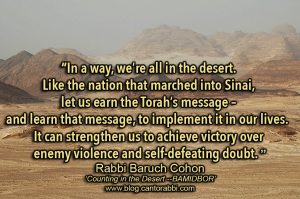COUNTING IN THE DESERT – Bamidbor – Numbers 1-4:20, by Rabbi Baruch Cohon
This week’s reading gives its name to the entire book which it opens. But the English name seems to bear no relationship to the Hebrew name of the same book. “Numbers” is not a translation of “Bamidbor,” which means “In the desert.” Actually, the Hebrew name sets the scene for the whole history described in this book, which follows the ancient Hebrew tribes through the desert, in their slow and perilous progress toward the Promised Land. The English name is appropriate to this week’s reading, however, since here we see the completion of the census Moses conducted just a couple of months earlier when the Tabernacle – the mishkan – was built. Then, every male Israelite of military age had to bring a contribution of half a shekel toward the construction of the first Jewish house of worship. By counting the coins, the people’s leaders knew the total number of potential fighters: 603,550.
Now Moses has to fill in the details. How many in each tribe, who will lead each tribe, where will each tribe camp, etc. The total here is identical with the total in the half-shekel count in Exodus 38:26. But the purpose of this census is different. Besides joining in a religious cause, the men of Israel are now registering for the draft – the IDF of Moses’ time — accepting responsibility for the safety of their camp, and acknowledging the authority of their tribal chiefs. In effect, this census – this re-count if you will – marks another step in developing both civil and military structure. Ancient Israel is becoming a nation. Not without pain, to be sure. Further along in this book of Bamidbor we will see their trials, tragedies, triumphs – all the milestones and missteps on the way to nationhood – even before crossing the Jordan. Each tribe is numbered here, from the largest, Judah at 74,600, to the smallest, Menasheh at 32,200. Only the tribe of Levi is not numbered since the men of Levi had military exemption; they did not serve in the army but were devoted to Tabernacle service. In fact they camped closest to the Tabernacle on three sides. And the families of Moses and Aaron camped on the east side. Rashi’s commentary points out that their neighbors on the east side of the camp were the tribes of Judah, Issachar and Zebulun, and because of that proximity those tribes produced great Torah scholars! Thus we learn about the great value of a good neighbor. So observes the Lubavitcher Rebbe.
Another feature of this week’s reading should not be overlooked. We will read that G-d spoke to Moses and the Israelite people in the desert. A place of danger! That is where they went when they left Egypt, without provisions, without protection, without plans. All they took with them was courage. Faith in G-d, confidence in themselves, perhaps a “here goes nothing” feeling that this is a chance they have to take. Certainly they were not above challenging Moses. Certainly they had to wait for one of their own leaders, Nakhshon ben Aminodov, to wade into the Red Sea before they could cross on dry land. Yet they moved ahead into a barren wasteland with no guarantees of success – or even of survival. Guts like that could impress the Divine. And so our ancestors received the Torah, and built the Mishkan,the portable sanctuary that served as their spiritual center for 40 grim years. To such a brave nation – despite their quarrels, their doubts, their mistakes – Moses brought G-d’s word. In the desert.
Some deserts bloom today, because the descendants of that nation make them bloom. And some of those descendants face challenges today that equal those of Moses’ time. In a way, we’re all in the desert. Like the nation that marched into Sinai, let us earn the Torah’s message – and learn that message, to implement it in our lives. It can strengthen us to achieve victory over enemy violence and self-defeating doubt. We were counted in the desert. Count us in now, everywhere.



